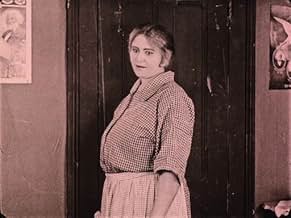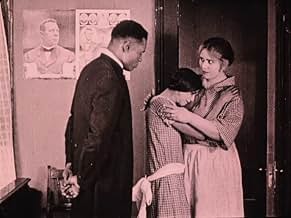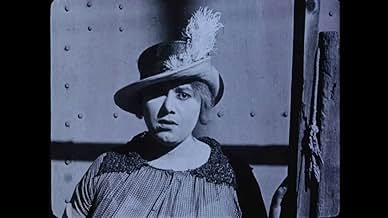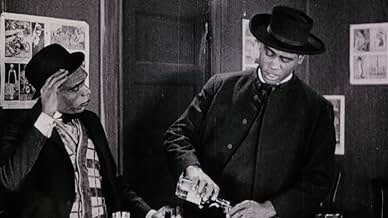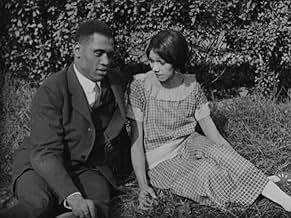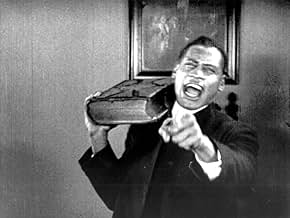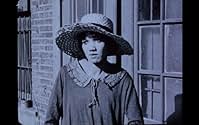AVALIAÇÃO DA IMDb
6,2/10
1,3 mil
SUA AVALIAÇÃO
Adicionar um enredo no seu idiomaA malevolent phony preacher plots to take advantage of a woman from his congregation who happens to be in love with his long-estranged identical twin brother.A malevolent phony preacher plots to take advantage of a woman from his congregation who happens to be in love with his long-estranged identical twin brother.A malevolent phony preacher plots to take advantage of a woman from his congregation who happens to be in love with his long-estranged identical twin brother.
- Prêmios
- 1 vitória no total
Marshall Rogers
- Speakeasy Proprietor
- (as Marshall Rodgers)
Mercedes Gilbert
- Martha Jane - Her Mother
- (não creditado)
Julia Theresa Russell
- Isabelle - the Girl
- (não creditado)
Avaliações em destaque
Body and Soul is an interesting film. Paul Robeson makes a powerful debut in this film about an escaped prisoner who blends into a small community as a beloved pastor. This film is an interesting period piece and was written, directed, and starred African-Americans in an era where that sort of thing wasn't done. Audiences today would be shocked at the stereotypical performances of the supporting cast and would be shocked that an African-American made this film. Well worth seeing for movie buffs. Robeson gives a great and powerful performance.
A melodrama involving a con man who (somehow) has assumed the role of a preacher (Paul Robeson), and along with an ex-cellmate, sets out to bilk the townspeople out of their money. He's also got his eye on a young woman (Julia Theresa Russell) who just so happens to prefer his kinder twin brother. Robeson turns in a reasonably strong performance in the dual role, even if the character of his twin is somewhat ridiculous. Russell is reasonably good too, and the rape scene told in flashback evokes horror and is well done, probably the film's best.
Overall the film suffers from a weak script, complete with an enormous "it was just a dream" cliché. Accounts vary as to whether the unsatisfying conclusion was due to the considerable problems Micheaux had getting it approved, which unfortunately resulted in a significant hack job. As it is though, it suffers from sloppy editing, has dangling plot points (like the ex-cellmate), and drags on for longer than it should have.
Looking at the film through the lens of today can also be troubling, because the dialogue the characters use is what we think of as stereotypical. As with other films from Micheaux, he unapologetically criticizes the African-American community. Later he would say this:
"I have always tried to make my photoplays present the truth, to lay before the Race a cross-section of its own life, to view the colored heart from close range. My results might have been narrow at times, due perhaps to certain limited situations which I endeavored to portray, but in those limited situations the Truth was the predominant characteristic. It is only by presenting those portions of the Race portrayed in my pictures in the light and background of their true state that we can raise our people to greater heights. I am too much imbued with the spirit of Booker T. Washington to ingraft false virtues upon ourselves, to make ourselves that which we are not. Nothing could be a greater blow to our own progress. The recognition of our true situation will react in itself as a stimulus for self-advancement."
Thus, we have this dialogue, and we have the church congregation falling for the lengthy sermons of a low-life who drinks alcohol out of what looks like a water glass while preaching. Micheaux and other black leaders like W.E.B. DuBois saw religion critically, and as something holding back African-American progress. That's something we also see in the film 'Within Our Gates.' The portrait of ignorance is not flattering, and some black filmgoers were not amused. One at the time likened it to D.W. Griffith's 'Birth of a Nation,' saying "One would expect a white screenwriter to fan the flames of hatred. But what can we say when a black man portrays our people in the same manner?" The white censors were also displeased, seeing in the evil traits of a minister, even a false one, as "sacrilegious, immoral, and would tend to incite to crime."
There is thus a brave honesty here, at least until that ending sequence, and for that I admire Micheaux. He also shows the vulnerability of women in the rape (although it's not the case that she's not believed - in fact it's the opposite, her mother and the congregation believe her and attack the culprit). While rough around the edges, there's a certain power in being a film from a legendary African-American director and featuring the debut of a star, Robeson, who was incredibly multi-faceted and should be better known. Both have done better work, but I'm glad I saw this one, and it's worth checking out.
Overall the film suffers from a weak script, complete with an enormous "it was just a dream" cliché. Accounts vary as to whether the unsatisfying conclusion was due to the considerable problems Micheaux had getting it approved, which unfortunately resulted in a significant hack job. As it is though, it suffers from sloppy editing, has dangling plot points (like the ex-cellmate), and drags on for longer than it should have.
Looking at the film through the lens of today can also be troubling, because the dialogue the characters use is what we think of as stereotypical. As with other films from Micheaux, he unapologetically criticizes the African-American community. Later he would say this:
"I have always tried to make my photoplays present the truth, to lay before the Race a cross-section of its own life, to view the colored heart from close range. My results might have been narrow at times, due perhaps to certain limited situations which I endeavored to portray, but in those limited situations the Truth was the predominant characteristic. It is only by presenting those portions of the Race portrayed in my pictures in the light and background of their true state that we can raise our people to greater heights. I am too much imbued with the spirit of Booker T. Washington to ingraft false virtues upon ourselves, to make ourselves that which we are not. Nothing could be a greater blow to our own progress. The recognition of our true situation will react in itself as a stimulus for self-advancement."
Thus, we have this dialogue, and we have the church congregation falling for the lengthy sermons of a low-life who drinks alcohol out of what looks like a water glass while preaching. Micheaux and other black leaders like W.E.B. DuBois saw religion critically, and as something holding back African-American progress. That's something we also see in the film 'Within Our Gates.' The portrait of ignorance is not flattering, and some black filmgoers were not amused. One at the time likened it to D.W. Griffith's 'Birth of a Nation,' saying "One would expect a white screenwriter to fan the flames of hatred. But what can we say when a black man portrays our people in the same manner?" The white censors were also displeased, seeing in the evil traits of a minister, even a false one, as "sacrilegious, immoral, and would tend to incite to crime."
There is thus a brave honesty here, at least until that ending sequence, and for that I admire Micheaux. He also shows the vulnerability of women in the rape (although it's not the case that she's not believed - in fact it's the opposite, her mother and the congregation believe her and attack the culprit). While rough around the edges, there's a certain power in being a film from a legendary African-American director and featuring the debut of a star, Robeson, who was incredibly multi-faceted and should be better known. Both have done better work, but I'm glad I saw this one, and it's worth checking out.
BODY AND SOUL (1925) is the third of Oscar Micheaux's surviving silents, with a cast exclusively comprised of African-American actors. It tells the story of Isaiah Jenkins (Paul Robeson), a phony reverend who preaches to a congregation in a small town in the American South, who is really an escaped convict. The locals look up to him, including Martha Jane (Mercedes Gilbert). Martha tries to push her daughter, Isabelle (Julia Theresa Russell) into marrying the reverend, even though she is already seeing his twin brother Sylvester (also played by Robeson). Isabelle, though, sees that he is not as pious as he appears to be. An incident takes place between Isaiah and Isabelle that drives Isabelle away from home, and Martha Jane is forced to confront an unpleasant truth she never would have imagined...
I felt that this was the best of Micheaux's surviving silent movies. The narrative is straightforward and easy to follow, without being burdened by excess characters or lengthy explanations. As was common with many silents, there are some melodramatic contrivances at times but nothing really insulting. Micheaux's narrative here is well focused and a flashback scene makes the movie more powerful. Paul Robeson is the main standout here, with a very charismatic performance as the fake preacher, alternately charming, intimidating, and aggressive – his acting is very expressive. Mercedes Gilbert, a famed black stage actress of the time, also does some nice work as the mother who has to accept that appearances can be deceiving. Some of her gestures and expressions are very much of her time, but she still projects a magnetism and emotional sincerity that makes her work convincing. Julia Theresa Russell is a bit more low-key, quite naturalistic in her portrayal.
Micheaux has some very effective camera-work here, particularly in the flashback scene which conveys disturbing events well with just a minimum of imagery and skillful editing. Not all of the editing here is superb, though – there are a few awkwardly staged moments, like a poorly choreographed fight scene and occasional repetition of action. However, despite that, the movie has an abundance of outstanding scenes.
BODY AND SOUL is, in conclusion, an advance over Micheaux's previous silents WITHIN OUR GATES and THE SYMBOL OF THE UNCONQUERED. It succeeds because of a focused, straightforward story, charismatic performances, and skillful production. SCORE: 8/10
I felt that this was the best of Micheaux's surviving silent movies. The narrative is straightforward and easy to follow, without being burdened by excess characters or lengthy explanations. As was common with many silents, there are some melodramatic contrivances at times but nothing really insulting. Micheaux's narrative here is well focused and a flashback scene makes the movie more powerful. Paul Robeson is the main standout here, with a very charismatic performance as the fake preacher, alternately charming, intimidating, and aggressive – his acting is very expressive. Mercedes Gilbert, a famed black stage actress of the time, also does some nice work as the mother who has to accept that appearances can be deceiving. Some of her gestures and expressions are very much of her time, but she still projects a magnetism and emotional sincerity that makes her work convincing. Julia Theresa Russell is a bit more low-key, quite naturalistic in her portrayal.
Micheaux has some very effective camera-work here, particularly in the flashback scene which conveys disturbing events well with just a minimum of imagery and skillful editing. Not all of the editing here is superb, though – there are a few awkwardly staged moments, like a poorly choreographed fight scene and occasional repetition of action. However, despite that, the movie has an abundance of outstanding scenes.
BODY AND SOUL is, in conclusion, an advance over Micheaux's previous silents WITHIN OUR GATES and THE SYMBOL OF THE UNCONQUERED. It succeeds because of a focused, straightforward story, charismatic performances, and skillful production. SCORE: 8/10
Body and Soul (1925)
*** (out of 4)
Paul Robeson plays a really sinister con man who will dip to any level to get what he wants. He pretends to be a Reverend and soon he sets his eyes on the good girl Isabelle (Mercedes Gilbert). At first her and her mother just see him as a kind-hearted preacher but soon the daughter realizes his evil ways include trying to steal her life savings.
Director Oscar Micheaux had already made several movies but there's no question that this here was going to be his epic. Robeson was already well-known on the stage so the two of them teaming up seemed like a grand idea but apparently the two men fought for most of the shooting time and apparently they hated each other so much that Robeson wouldn't even discuss this film. It's also said that the original version was much darker but the director was forced to cut it down by several reels, which is really too bad.
As it stands, BODY AND SOUL is a very impressive movie and it's really shocking at how well it turned out and especially when you consider that the budget was very low and of course there was the behind-the-scenes issues. There's no question that the greatest thing about the picture is the performance by Robeson who really does do a terrific job at coming off as this holy man. He certainly makes you believe this fake side of his character and it's easy to see why someone would fall for him. The actor also perfectly nails the more sinister side of the character.
The film looks very good, again, for its budget and the editing is also good. The entire movie looks very professional, which wasn't always the case for these early race movies. I'd also argue that the story itself was quite good and it really wasn't too often that you'd see any movie taking a look at religious figures in a negative way. BODY AND SOUL is certainly another winning film from the director and a great start for Robeson.
*** (out of 4)
Paul Robeson plays a really sinister con man who will dip to any level to get what he wants. He pretends to be a Reverend and soon he sets his eyes on the good girl Isabelle (Mercedes Gilbert). At first her and her mother just see him as a kind-hearted preacher but soon the daughter realizes his evil ways include trying to steal her life savings.
Director Oscar Micheaux had already made several movies but there's no question that this here was going to be his epic. Robeson was already well-known on the stage so the two of them teaming up seemed like a grand idea but apparently the two men fought for most of the shooting time and apparently they hated each other so much that Robeson wouldn't even discuss this film. It's also said that the original version was much darker but the director was forced to cut it down by several reels, which is really too bad.
As it stands, BODY AND SOUL is a very impressive movie and it's really shocking at how well it turned out and especially when you consider that the budget was very low and of course there was the behind-the-scenes issues. There's no question that the greatest thing about the picture is the performance by Robeson who really does do a terrific job at coming off as this holy man. He certainly makes you believe this fake side of his character and it's easy to see why someone would fall for him. The actor also perfectly nails the more sinister side of the character.
The film looks very good, again, for its budget and the editing is also good. The entire movie looks very professional, which wasn't always the case for these early race movies. I'd also argue that the story itself was quite good and it really wasn't too often that you'd see any movie taking a look at religious figures in a negative way. BODY AND SOUL is certainly another winning film from the director and a great start for Robeson.
Two escaped fugitives bring ruin to an African-American community. One passes himself off as Rev. Isaiah T. Jenkins (Paul Robeson) and the other is his cellmate Yello-Curley' Hinds. The fake reverend corrupts a member of his congregation, Isabelle Perkins, who happens to love Sylvester, Jenkins' long-lost identical twin brother.
First, I don't like some of the text which tries to use colloquial black speech. It's downgrading but also makes it harder to understand. Maybe the black audience of the day feels more comfortable with that. This is to be black cinema made for a black audience. I'm willing to accept it for what it is. On the other hand, I don't think some of the plot points make sense.
The mother wouldn't buy Sylvester revealing himself as a reverend right after telling her daughter to find herself a reverend. The mother would assume that the young couple is faking it. I also don't think the twin brother idea works in this plot. Apparently, this movie was chopped up to satisfy the censors and maybe the longer version functions better. The main aspect that really works is the great Paul Robeson. He is the magnetic lead and he delivers compelling performances.
First, I don't like some of the text which tries to use colloquial black speech. It's downgrading but also makes it harder to understand. Maybe the black audience of the day feels more comfortable with that. This is to be black cinema made for a black audience. I'm willing to accept it for what it is. On the other hand, I don't think some of the plot points make sense.
The mother wouldn't buy Sylvester revealing himself as a reverend right after telling her daughter to find herself a reverend. The mother would assume that the young couple is faking it. I also don't think the twin brother idea works in this plot. Apparently, this movie was chopped up to satisfy the censors and maybe the longer version functions better. The main aspect that really works is the great Paul Robeson. He is the magnetic lead and he delivers compelling performances.
Você sabia?
- CuriosidadesFilm debut of Paul Robeson.
- Erros de gravaçãoMother Martha Jane looks through her Bible for the saved money to show it to the sisters, but it's missing. She leaves the book on the table and while searching through some drawers, three shots of the sisters show no book on the table. When the mother returns to the table, the book is back.
- Citações
Yello-Curley' Hinds - the Phony Reverend's Former Jailmate: I tell you that I was not seekin' you out, but dropped off here to find girls for 'Cotton Blossom's Shoulder Shakers' - - and this little Isabelle - - she appeals to muh!
- Versões alternativasRaymond Rohauer, Inc. copyrighted a restored version in 1979 with a music track and new credits. The music was composed and performed by Lee Erwin and was recorded at Carnegie Hall Cinema, New York. It's running time is 83 minutes.
- ConexõesFeatured in Black Shadows on a Silver Screen (1975)
Principais escolhas
Faça login para avaliar e ver a lista de recomendações personalizadas
- How long is Body and Soul?Fornecido pela Alexa
Detalhes
- Tempo de duração
- 1 h 42 min(102 min)
- Mixagem de som
- Proporção
- 1.33 : 1
Contribua para esta página
Sugerir uma alteração ou adicionar conteúdo ausente

